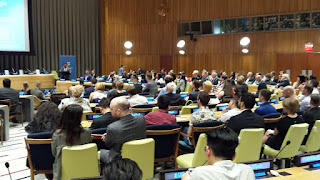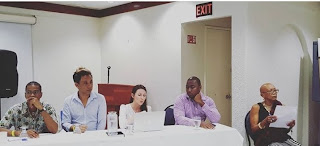OASLACLGBTTI Coalition Bolivia Release
Posted July 8th, 2012
COALITION OF LGBTTTI ORGANIZATIONS WORKING IN THE OAS
CELEBRATE THE APPROVAL OF THE FIFTH RESOLUTION ON HUMAN RIGHTS, SEXUAL ORIENTATION AND GENDER IDENTITY
The Coalition of Lesbian, Gay, Bisexual,
Transgender, Transsexual, Travesti and Intersex (LGBTTTI) Latin American and
Caribbean organizations, formed by groups belonging to more than 23 countries
expresses in this communiqué its assessment of the activities of the 42nd
General Assembly of the Organization of American States, which took place in Cochabamba,
Bolivia on June 3 - 5, 2012.
This Assembly adopted the fifth resolution AG/RES. 2721 (XLII-O/12) “Human Rights, Sexual
Orientation and Gender Identity.” This resolution, which is the result of the
long term advocacy of the group, includes all the issues contained in the
previous resolutions, calling on member states to introduce measures against
discrimination and human rights violations and to implement public policies.
Furthermore it requests the IACHR to prepare a study on legislation
and provisions in force in the OAS member states restricting the human rights
of individuals by reason of their sexual orientation or gender identity and to
prepare, based on that study, guidelines aimed at promoting the decriminalization
of homosexuality.
About the Coalition’s activities
Beyond
the resolution that has been formally adopted, the Coalition celebrates the
consolidation of its space as civil society component after five years of
advocacy work within the OAS and in the region, before, during and after the General
Assemblies.
In the days preceding the 42nd
General Assembly, the Coalition organized a parallel event in preparation for
the advocacy and participation within the OAS. The main discussion topics were:
(a) implementation of the resolution “Human Rights, Sexual Orientation and
Gender Identity”; (b) Interaction with the Inter-American Commission on Human
Rights (with specific focus on thematic hearings); (c) Interaction with the
Commission on Juridical and Political Affairs; (d) Advocacy in the negotiation
process of the draft Convention against Racism and All Forms of Discrimination
and Intolerance; (e) Advocacy with member states.
During the two days, invited
participants included Jorge Sanin, director of the Department of
International Relations of the OAS, who highlighted the importance of the
commitment of the LGBTTTI civil society in all processes of the OAS and the
increasing visibility of the issue within the OAS, particularly with reference
to the Hemispheric Forum.
The Coalition met MP Gladys
Prieto Moreyra, Chairperson of the Human Rights Commission of the Bolivian
Parliament, and MP Saul Limbert Garabito, member of the same
Human Rights Commission. They both welcomed the Coalition, expressed their
commitment on the rights of LGBTTTI people and, in particular, their support to
the law on Gender Identity, that has been recently endorsed by the
Vice-Minister of Justice and will be sent for discussion to the Bolivian
parliament in the next days.
The Coalition also had a
meeting with Mr. Darío Paya, ambassador of the Republic of Chile at
the OAS, who spoke about the need that society move forward in the
inclusion and respect for diversity, and congratulated the Coalition for his
presence at the OAS.
During the informal dialogue with the Secretary
General of the OAS and the civil society in San Salvador, six delegates of the
LGBTTTI coalition addressed to Secretary General José Miguel Insulza their
concerns regarding the undue influence of religion on states and the weakening
of the principle of secularity; violence and discrimination that LBTTTI women
suffer within their own families and communities; hate crimes and
discrimination, discriminatory archaic buggery and cross dressing laws, particularly
in the English-speaking Caribbean; the need for recognition of the gender and
sex identity for transgender, transsexual, travesti and intersex people; the
need of completing the negotiation process of the Convention against Racism and
all Forms of Discrimination and Intolerance; and the importance to consider the
proposal for a Convention on Sexual and Reproductive Rights advanced by civil
society.
Mr. Insulza confirmed the OAS’s commitment to fight
for recognition of the rights of LGBTTTI individuals and the need to move
forward in the negotiation of the Inter American Convention against Racism and
all Forms of Discrimination and Intolerance. He also committed to facilitate a
meeting between member states, civil society and the Inter-American Commission
on the issue.
The dialogue between Civil Society and the Heads of
Delegations of the OAS Member States took place on June 3. Raiza Torriani,
Bolivian trans activist, was the spokesperson for the LGBTTTI Coalition. The
full text of the speech is published below. In her intervention, Raiza made
reference, with particular emphasis, on the situation of LGBTTTI people in the
English-speaking Caribbean, mentioning each member of the Coalition in attendance
from that region, who stood up calling the attention of the Heads of Delegations
and the audience. As result of this action, the state representatives of St.
Kitts & Nevis, Guyana and Trinidad & Tobago expressed their concerns on
the issues and committed to raise the question to their respective governments.
The representatives of Brazil and Argentina also expressed their commitment of
their countries on the rights of LGBTTTI people.
We welcome the increasing interest for the work of
the coalition that represents an acknowledgment of the work carried out in
these years.
We thank COC Netherlands, UNAIDS, UNDP, MamaCash
and the Campaign for an Inter-American Convention on Sexual and Reproductive
Rights, and Heartland Alliance for Human Needs & Human Rights for their support to make our participation to this General Assembly
possible.
The participants of
the Coalition of LGBTTTI Organizations of Latin America and the Caribbean
within the OAS were:
1. AIREANA -
Camila Zabala – Paraguay,
2. ASOCIACIÓN
LIDERES EN ACCION -Germán Rincón Perfetti - Colombia,
3. COALITION ADVOCATING FOR INCLUSION OF SEXUAL ORIENTATION – Kareem
Griffith – Trinidad and Tobago,
4. COLECTIVA
MUJER y SALUD, Claudia Saleta – Dominican Republic,
5. COLECTIVO
UNIDAD COLOR ROSA – Claudia Spellmant – Honduras,
6. TALLER
COMUNICACIÓN MUJER, Tatiana Cordero - Ecuador,
7. AIDS FREE WORLD - Maurice Tomlinson – Jamaica,
8. MULABI-COSTA
RICA – Natasha Jiménez – Costa Rica,
9. ORGANIZACIÓN
DE TRANSEXUALES POR LA DIGNIDAD DE LA DIVERSIDAD – Andrés Rivera Duarte –
Chile,
10. ORGANIZACIÓN
TRANS REINAS DE LA NOCHE – Johana Ramírez – Guatemala,
11. GRUPO
IDENTIDADE RED AFRO LGBTI – Marcos Cesar Gomez – Brazil,
12. RED
LATINOAMERICANA Y DEL CARIBE DE PERSONAS TRANS - Marcela Romero- Argentina,
13. RED
NICARAGUENSE DE ACTIVISTAS TRANS – Silvia Martínez – Nicaragua,
14. SOCIETY AGAINST SEXUAL ORIENTATION DISCRIMINATION- Namela Baynes-Rowe -
Guyana,
15. UNIBAM – Caleb Orozco – Belize,
16. WOMEN’S WAY – Tieneke Sumter – Suriname,
17. TRANSREDBOLIVIA TREBOL - Raiza Torriani – Bolivia.
As partners of the Coalition: Stefano Fabeni and Marcelo Ernesto
Ferreyra – Heartland Alliance for Human Needs & Human Rights
Cochabamba, Bolivia - June 5, 2012
DECLARATION OF THE COALITION OF LESBIAN, GAY, BISEXUAL, TRAVESTI,
TRANSEXUAL, TRANSGENDER AND INTERSEX (LGBTTTI) ORGANISATIONS OF THE AMERICAS
BEFORE THE GENERAL ASSEMBLY OF THE OAS
COCHABAMBA,
BOLIVIA, JUNE 3, 2012
Mister Secretary General, Ministers, Members of the
Official Delegations, Civil Society Representatives,
We, the Lesbian, Gay, Bisexual, Travesti, Transsexual,
Transgender and Intersex organizations, convened in Cochabamba, Bolivia, from
May 30 to June 1, 2012, in accordance with the directives established by the
General Assembly of the OAS in its resolutions AG/RES.2092(XXXV-O/05); CP/RES.759(1217/99);
AG/RES.840(1361/03); AG/RES.1707(XXX-O/00) and AG/RES.1915(XXXIII-O/03), which
determine a regulatory framework to enhance and strengthen civil society
participation in OAS activities and in the Summit of the Americas process, express
our concern that food security is limited to the right to food, while we
consider that it is also related to the rights to work, health, housing,
education, equality and non-discrimination, a dignified life, respect for
nature and the collective rights of indigenous peoples.
We show our concern for the situation of exclusion and
vulnerability of lesbian, gay, bisexual, transsexual, transgender, travesti and
intersex people, as well as afro-descendant people, migrants, refugees, women,
youth, differently-abled people, the elderly, indigenous peoples, ethnic
groups, people living with HIV, religious minorities, and those who live in
situations of armed conflict or natural disasters. In these circumstances, they
are exposed to the most severe discrimination, which prevents them from
accessing to a good quality of life.
As intersex and trans persons, whose
identity is not recognized, we are not primary subjects in the development of
public policies; we are expelled from schools and from our homes, while the
society and governments deny the recognition of our condition of human beings,
forcing us since childhood to live on the streets, exposed to sexual
exploitation. This affects the development of our personality and the exercise
of our basic rights.
Several countries do not secure our
rights and do not protect our lives; in others we are criminalized by the law,
and private and public healthcare services consider our conditions as
pathologies.
Indifference, omission and complicity
by many states in cases of discrimination and violence against the LGBTI
community make those more severe and limit the enjoyment of the basic needs of
our communities. This situation is even more serious in the case of the
legislation of 11 Anglophone Caribbean countries. We are here with our
colleagues from Belize, Guyana, Trinidad and Tobago, Jamaica, countries that
criminalize same-sex conducts between consenting adults. In fact, the lack of
political will of the Anglophone Caribbean member states denies human rights
and, as a consequence, represents a limit for job opportunities and for
decision-making on public policies related to HIV, as well as increase homelessness
among youth.
As lesbian women we demand that the
states recognize the different types of families, as well as their inclusion in
national census; the contribution we offer to food security for our families
and our children must be recognized. The lack of recognition of the way we
contribute as LBTI women to the wellbeing of our families and to the state
economy though our productive and reproductive work does not make our
contribution to life visible.
Similarly, we recall the attention on
the impact that domestic violence has on food security, as it is impossible in
circumstances whereby the right to food for our children is denied and when our
economic autonomy is limited or denied.
Finally, we urge member states to
respect the principle of secularism, as the lack of separation between church
and state, increases oppression, discrimination and social exclusion.
Therefore we demand:
To the Member States:
- To adopt laws and public policies in accordance with
the commitments taken in virtue of the resolutions "Human Rights, Sexual Orientation and Gender Identity" approved
in the previous General Assemblies.
- To adopt laws that recognize the right to identity
of trans persons taking as an example the good practice represented by the law
recently approved by Argentina.
- To repeal laws that criminalizes
same sex intimacy.
- To realize all efforts required in
the shortest period of time to finalize the adoption of the Draft
Inter-American Convention against Racism and All Form of Discrimination and
Intolerance.
- To consider the proposal for an
Inter-American Convention on Sexual and Reproductive Rights.
- To sign, ratify and implement all
Inter-American instruments for the protection of human rights.
- To effectively strengthen their
commitment with the Inter-American Commission on Human Rights, with the support
of the Secretary General of the OAS, and abstain from initiatives that might
weaken the Inter-American system of protection of human rights.
To the General Assembly:
- To approve the draft resolution “Human
Rights, Sexual Orientation and Gender Identity” presented by the Brazilian delegation, whose initiative we fully
endorse.
We are not born vulnerable; lack of
recognition makes us vulnerable.
HUMAN RIGHTS, SEXUAL ORIENTATION, AND GENDER IDENTITY
(Adopted at the second plenary
session, held on June 4, 2012)
THE GENERAL ASSEMBLY,
TAKING
INTO ACCOUNT resolutions AG/RES. 2435 (XXXVIII-O/08), AG/RES. 2504
(XXXIX-O/09), AG/RES. 2600 (XL-O/10), and AG/RES. 2653 (XLI-O/11), “Human
Rights, Sexual Orientation, and Gender Identity”;
REITERATING:
That the Universal Declaration of Human Rights affirms that all human
beings are born free and equal in dignity and rights and that everyone is
entitled to all the rights and freedoms set forth in that instrument, without
distinction of any kind, such as race, color, sex, language, religion,
political or other opinion, national or social origin, property, birth, or
other status; and
That the
American Declaration of the Rights and Duties of Man establishes that every
human being has the right to life, liberty, and
security of his person without
distinction as to race, sex, language, creed, or any other factor;
CONSIDERING that the Charter of the Organization of American States
proclaims that the historic mission of the Americas is to offer to man a land
of liberty and a favorable environment for the development of his personality
and the realization of his just aspirations;
REAFFIRMING the principles of universality, indivisibility, and
interdependence of human rights;
TAKING NOTE:
Of the creation by the Inter-American Commission on Human Rights of the
Unit for the Rights of Lesbians, Gays, and Bisexual, Transsexual, and Intersex
Persons (LGBTI), and of its work plan, which includes the preparation of a
hemispheric report on this issue;
Of the Second Report of the IACHR on the Situation of Human Rights
Defenders in the Americas, according to which organizations that promote and
defend the human rights of LGBTI persons play a fundamental role in the region
in terms of public oversight to ensure compliance with the states’ obligations
vis-à-vis the rights to privacy, equality, and non-discrimination, and are
faced with obstacles, among them, murder, threats, criminalization of their
activities, the failure to take a focused approach to the investigation of
crimes committed by both state and non-state actors against them, and discourse
calculated to discredit the defenders of the rights of LGBTI persons; and
Of the
Declaration on Sexual Orientation and Gender Identity, presented to the United
Nations General Assembly on December 18, 2008; and
NOTING
WITH CONCERN the acts of violence and related human rights violations as well
as discrimination practiced against persons because of their sexual orientation
and gender identity,
RESOLVES:
1.
To condemn
discrimination against persons by reason of their sexual orientation and gender
identity; and to urge the states within the parameters of the legal
institutions of their domestic systems to eliminate, where they exist, barriers
faced by lesbians, gays, and bisexual, transsexual, and intersex (LGBTI)
persons in access to political participation and in other areas of public life.
2.
To encourage
member states to consider, within the parameters of
the legal institutions of their domestic systems, adopting public
policies against discrimination by reason of sexual orientation and gender
identity.
3.
To condemn acts
of violence and human rights violations committed against persons by reason of
their sexual orientation and gender identity; and to urge states to strengthen
their national institutions with a view to preventing and investigating these
acts and violations and ensuring due judicial protection for victims on an equal
footing and that the perpetrators are brought to justice.
4.
To urge states
to ensure adequate protection for human rights defenders who work on the issue
of acts of violence, discrimination, and human rights violations committed
against individuals on the basis of their sexual orientation and gender
identity.
5.
To request the
Inter-American Commission on Human Rights (IACHR) to pay particular attention
to its work plan titled “Rights of
LGBTI People” and, in keeping with its established practice, to prepare a
hemispheric study on the subject; and to urge member states to support the
efforts of the Commission in this area.
6.
To request the IACHR to prepare a study on
legislation and provisions in force in the OAS member states restricting the
human rights of individuals by reason of their sexual orientation or gender
identity and to prepare, based on that study, guidelines aimed at promoting the
decriminalization of homosexuality.
7.
To urge the member states that has not yet done so
to consider signing, ratifying, or acceding to, as the case may be, the
inter-American human rights instruments.
8.
To request the
Permanent Council to report to the General Assembly on the implementation of
this resolution. Execution of the activities envisaged in this resolution will
be subject to the availability of financial resources in the program-budget of
the Organization and other resources.



Comments
Post a Comment